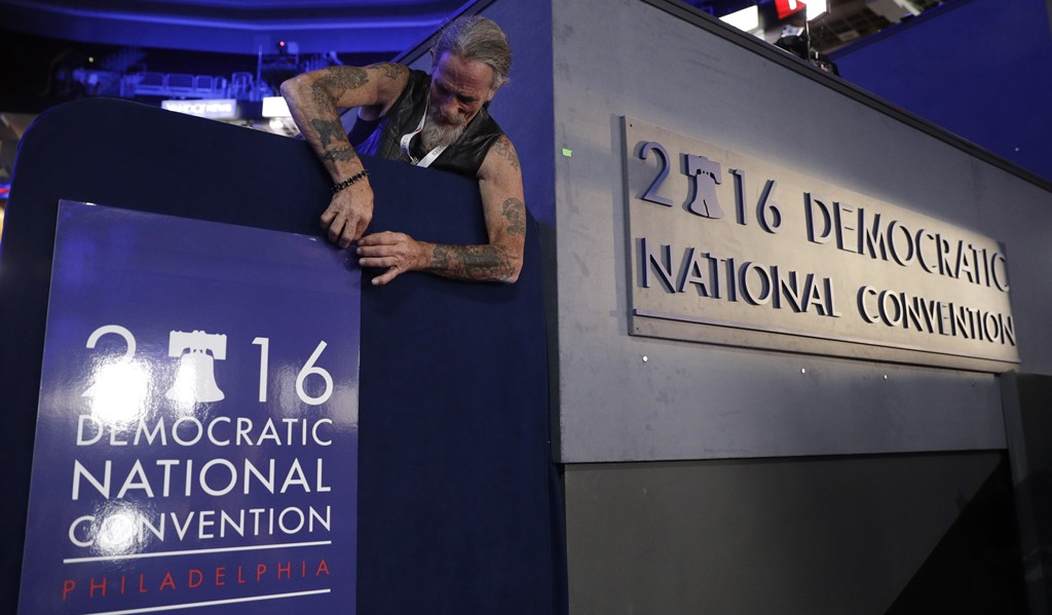If things had proceeded according to schedule, we'd be checking the polls this week to see if Joe Biden had gotten a bounce from his acceptance speech in Milwaukee. That's because the Democratic National Convention was originally scheduled for July 13-16.
It has since been postponed, due to COVID-19, to August 17-20, and will evidently be transformed into a mostly virtual event.
This makes obvious, good sense. It's hard to imagine an environment more conducive to spreading this particular virus than a convention floor so crammed with people cheering and chanting that it takes 10 minutes to move 5 feet.
I know what that's like, since I have attended in one way, shape or form, 24 Democratic and Republican national conventions, starting in 1968. That's more than one-quarter of the national conventions held by the Democrats since 1832 and by the Republicans since 1856.
With so many memories, fond and otherwise, of past conventions, as I've written elsewhere, I feel a certain sadness at their demise, or virtualization.
But it's probably about time. National conventions no longer serve their original purpose or the uses the parties and the press have made of them in the past half-century.
The national conventions were, for their first 130 years, a unique communications medium. They were the only place and time where party politicians could communicate frankly and bargain personally. They were the only place where people could discover which candidates had genuine support and which just gave lip service.
The conventions' folderol -- eloquent keynote and nomination speeches, hourlong demonstrations, multiple ballots (103 for Democrats in 1924) -- were not just entertainment, but ways of working out what parties from dozens of states really stood for.
Recommended
Two developments in the late 1950s ended the conventions' monopoly over frank communication: direct-dial, long-distance telephoning and jet airline travel. Suddenly, politicians in multiple states could constantly speak and frequently meet with one another. It's no coincidence that the last multi-ballot convention and the last nomination determined by a credentials challenge were both in 1952. They were also the first conventions televised to national audiences.
Conventions still had some unscripted moments -- John Kennedy clinching the Democratic nomination on the last state in the alphabetical roll call, Barry Goldwater proclaiming that "extremism in the defense of liberty is no vice," Mayor Richard J. Daley booing a speaker who decried "Gestapo tactics" in the streets of Chicago.
But they lost their aura of unpredictability when CBS' Martin Plissner put together the first network delegate count in 1968. Network delegate counts proved their reliability on close roll calls in 1972 and 1976.
I remember being in the hall in Chicago in 1968, keeping track of the roll call as party rebels beat the convention managers and created the first delegate-selection reform commission. Its rule changes meant that, by 1972, most delegates were chosen, not in back-room caucuses of party insiders, but in primaries -- and, effectively, by candidates, not state and local party leaders.
Since then, conventions have mostly been choreographed by nominees' campaigns as television ads to celebrate the candidate, winding up with a stirring acceptance speech. In the days of three-network TV dominance, audiences were huge, and pollsters recorded massive post-convention bounces.
Only occasionally was the show marred by unrehearsed dissension, as when Edward Kennedy evaded Jimmy Carter's handshake in 1980 (I had a podium pass that year) or Ted Cruz refrained from endorsing Donald Trump in 2016 (I watched from the Texas delegation).
If the parties liked the post-1968 conventions as a campaign tool, the press loved them for the opportunity to schmooze with politicos from across the country, on the convention floor and in elaborate receptions and parties paid for by hugely profitable news media.
But conventions this century have gotten less useful to the parties and the press. With a proliferation of TV choices, conventions no longer have captive audiences. Viewership of acceptance speeches has plateaued around 30 million even as turnout zoomed from 105 to 137 million, and the dwindling number of movable voters tune them out. Post-convention bounces have become minimal.
As for the press, with media profits down or disappearing, the receptions have become less glittering, while electronic media has made sources routinely available outside convention sites.
President Donald Trump would love to speak to a packed hall, but after his tepid turnout in Tulsa, that's not likely. COVID-19 will apparently give everyone an excuse to discard a traditional ritual that doesn't much serve anyone's purpose.
Still, there's something sad about breaking the links in an unbroken chain going back nearly two centuries. Every four years, my eyes tear up as I watch the workmen clear the balloons and carry the folding chairs off the convention floor after it is adjourned sine die. Not this year.
###
Michael Barone is a senior political analyst for the Washington Examiner, resident fellow at the American Enterprise Institute and longtime co-author of The Almanac of American Politics.
COPYRIGHT 2020 CREATORS.COM

























Join the conversation as a VIP Member